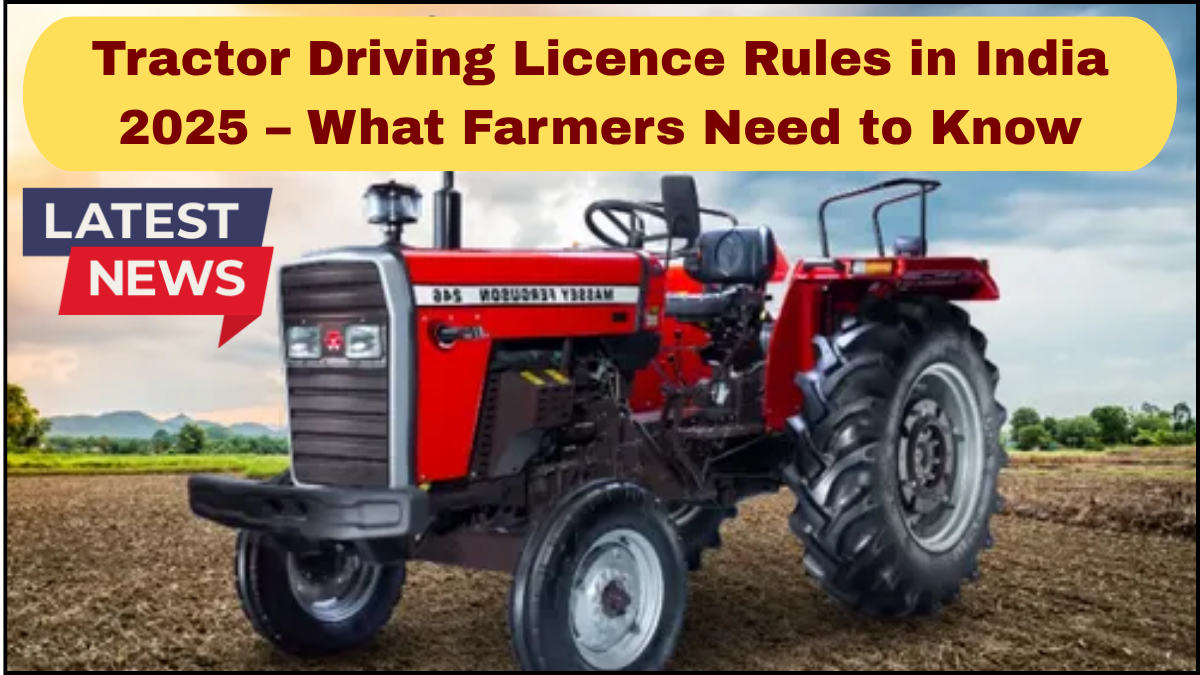With modern agriculture increasingly dependent on mechanization, knowing the updated Tractor License Rules in India is essential for farmers in 2025. Whether you’re a seasoned farmer or a newcomer planning to use tractors for farming or transport, understanding these rules ensures compliance with the law and promotes safe operation on rural and public roads.

Let’s break down the key regulations, licensing categories, age requirements, and other crucial information that every farmer needs to stay informed in 2025.
What Is a Tractor License and Why Is It Required?
A tractor driving license is a legal document that permits individuals to operate agricultural tractors on public roads. While private use on farmland may not always require a license, any operation involving public transport routes or commercial usage falls under regulatory oversight.
Under the Motor Vehicles Act, tractors are classified as non-transport vehicles when used exclusively for agricultural purposes. However, licensing is still mandatory for driving them on public roads, even for short stretches between fields.
Driving Age & Categories for Tractor Licenses
The Government of India has specific driving age & categories for different vehicle types, including tractors.
Minimum Age Requirement
-
The legal minimum age to drive a tractor in India is 16 years for non-transport agricultural purposes.
-
For transport/commercial use, the driver must be 18 years or older, as per standard motor vehicle licensing norms.
License Categories for Tractors
Tractor licenses fall under these categories:
-
LMV (NT) – Light Motor Vehicle (Non-Transport): Used when a tractor is solely for agricultural purposes.
-
Transport License – Required when tractors are modified for or used in commercial operations such as towing goods trailers.
Applicants should apply for the appropriate category depending on whether the tractor will be used for personal agricultural use or for transport.
How to Apply for a Tractor License in 2025
The application process in 2025 has been simplified and digitized. Here are the steps:
-
Eligibility Check: Ensure you meet the age requirement and have the necessary educational or training background (basic literacy is generally sufficient).
-
Learner’s License (LL): Apply online through the Parivahan portal for an LL.
-
Training and Practice: While not mandatory in all states, undergoing tractor operation training from a certified driving school is strongly recommended.
-
Driving Test: After a minimum of 30 days from LL issuance, you can apply for a driving test. The test evaluates your control over the vehicle, understanding of road signs, and ability to drive safely.
-
Permanent License: Upon passing the test, you will receive a permanent tractor driving license valid for a set duration (usually 20 years or until the age of 50, whichever comes first).
Key Rules and Documentation Requirements
To get a tractor license, you’ll need to provide:
-
Proof of age (Aadhar, birth certificate, PAN)
-
Address proof (utility bills, voter ID, etc.)
-
Passport-sized photos
-
Medical certificate (Form 1A for applicants above 40 or applying for transport license)
-
Learner’s License number
Important Updates in 2025
In response to rising tractor-related incidents and the need for better regulation, the Indian government introduced stricter safety compliance and training protocols in 2025. Here are the major updates:
-
Mandatory Safety Awareness Module: All applicants must complete an online safety awareness module before scheduling a test.
-
Trailer Towing Regulation: If using a tractor with a trailer for non-agricultural purposes, an endorsement is now required on the license.
-
Smart Card Licenses: All new licenses are issued in smart card format with QR codes for easy verification.
Penalties for Driving Without a Valid Tractor License
Operating a tractor without a valid license can result in:
-
Fines up to ₹5,000
-
Vehicle impoundment
-
Disqualification from obtaining a license for a defined period
Such penalties are strictly enforced, especially for commercial use or when involved in road incidents.
Why This Matters for Farmers
Getting the right license isn’t just about avoiding fines—it’s about ensuring safety and protecting your legal rights. In case of an accident or insurance claim, a valid license is essential. Many states also require license details when applying for agriculture subsidies or government support schemes that involve machinery.
FAQs – Tractor License Rules in India 2025
Q1: Can a 16-year-old drive a tractor in India?
Yes, but only for non-transport agricultural purposes on private land or limited public road access, and only with a valid LMV (NT) learner’s license.
Q2: Is it mandatory to take training from a driving school?
While not compulsory everywhere, it’s strongly recommended for first-time applicants to ensure safe operation and better chances of passing the driving test.
Q3: Can I use my car driving license to drive a tractor?
Only if the car license includes the LMV (NT) endorsement and you’re using the tractor for non-commercial agriculture. For transport use, a separate endorsement is necessary.
Q4: How long is a tractor driving license valid?
Typically, the validity is 20 years or until the age of 50, whichever is earlier. After that, periodic renewals are required.
Q5: Do I need a separate license for using a tractor with a trailer?
Yes, if the trailer is used for commercial or transport purposes, additional endorsements or a transport license category is required.
click here to learn more